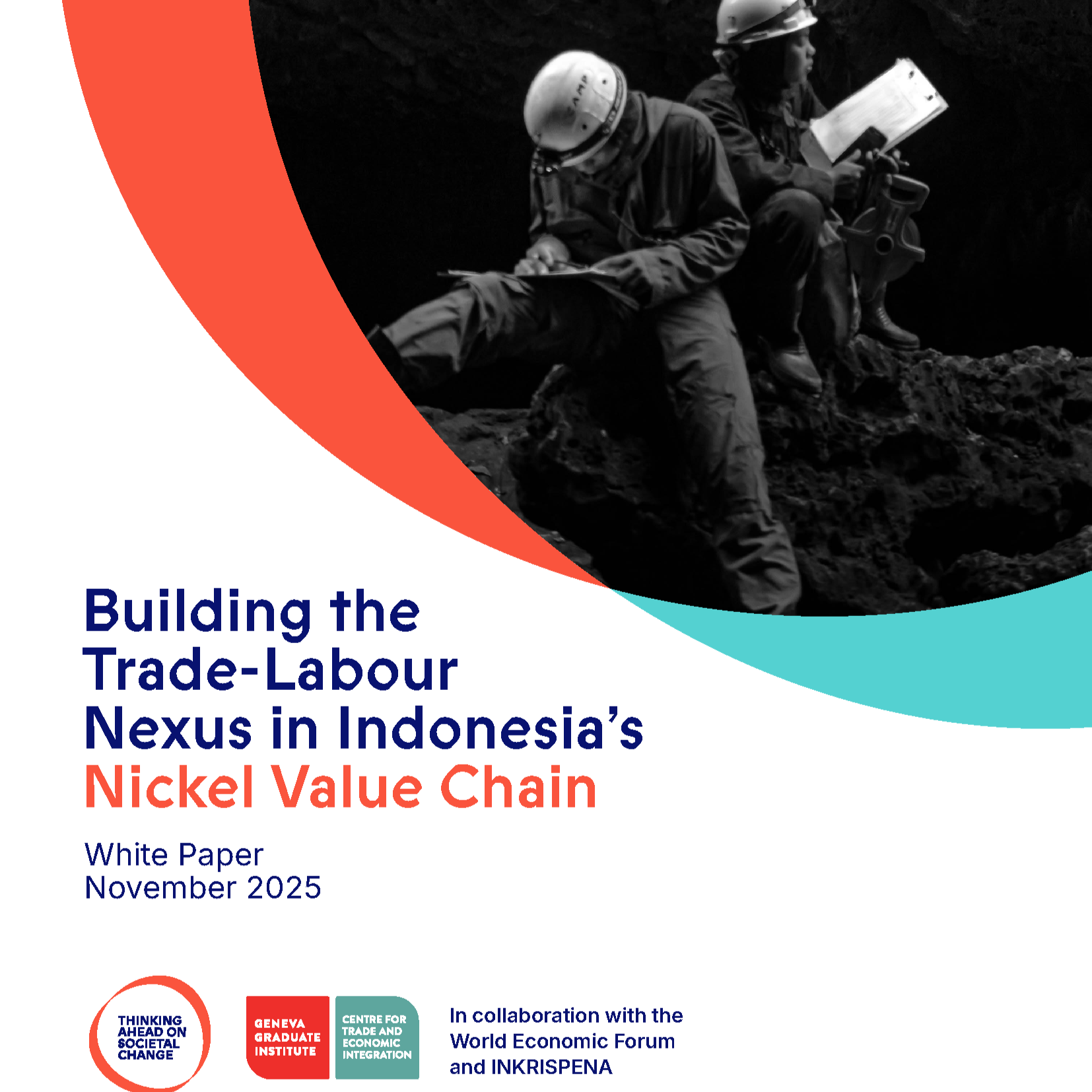Geneva Dialogue on Trade and Labour
Country Perspectives from Geneva Missions
The Geneva Dialogue on Trade and Labour, hosted by the TASC Platform and the World Economic Forum Trade and Investment Team at the World Economic Forum headquarters on 27 October 2025, brought together country missions and institutional partners to reflect on how trade and labour policies can evolve together in times of transition.
The Dialogue forms part of the broader Trade and Labour Programme, a joint initiative of the TASC Platform and the World Economic Forum, supported by the Laudes Foundation. The Programme convenes stakeholders across the multilateral system to examine how trade and labour intersect in the context of digital transformation, green industrialisation, and global supply chains.
Building on the Programme’s country-specific deep dives in Kenya and Indonesia, the Dialogue links national experience with the multilateral debates shaping trade and labour policy in Geneva, showing how national experience can inform global cooperation and how coherence between trade and labour policy can be advanced in practice.
Ambassador Valérie Berset Bircher, Head of International Labour Affairs at the Swiss State Secretariat for Economic Affairs (SECO), laid the foundation for the conversation, underlining the need to rebuild confidence in the multilateral trading system.
“While it is easy to blame geopolitics, the deeper causes of today’s discontent lie elsewhere: the benefits of trade remain unevenly shared, both among and within countries. Too many people still feel left behind.”
Her intervention echoed Switzerland’s long-standing commitment to coherence between trade and social policy, noting that:
“The message is clear, better alignment between economic and social development, between trade and labour policy, is not a luxury but a necessity if we are to maintain the benefits of the multilateral system.”
In her opening remarks, H.E. Ambassador Nahida Sobhan, Permanent Representative of Bangladesh to the United Nations in Geneva, reminded participants that:
“workers must remain at the centre of the global value chain. Trade policy must therefore uphold a simple but essential principle: economic integration must go hand in hand with social inclusion.”
At a moment when geo-economic fragmentation continues to strain global supply chains and deepen inequality, the tone for the rest of the dialogue was set as she underscored the need for trade to serve people, not just markets.
Kenya’s Ambassador, James Ndirangu Waweru, EBS, Deputy Permanent Representative, Permanent Mission of Kenya to the United Nations in Geneva, carried the dialogue forward, deepening the discussion on shared responsibility, grounded in the urgent need for high-quality jobs - those that provide fair wages, safe working conditions, and opportunities for growth.
“The discussions we engage in today are not merely academic. They have real-world implications for millions of workers, families, and communities. Our policies must reflect this urgency, ensuring that workers benefit from the opportunities created by trade.”
He encouraged participants to remain steadfast in commitments and collaborations towards inclusivity and equity in trade and labour, to ensure that every worker has the opportunity to thrive in this changing world, and where workers are not just participants but key architects of their futures.
Ms. Nadine Nickner, Counsellor at the Permanent Mission of Canada to the United Nations in Geneva, reflected on Canada’s forward-looking approach to sustainable and equitable trade, highlighting Canada’s Supply Chains Act as an example of how enhanced transparency and accountability can support responsible business practices and strengthen resilience across global value chains.
Closing the Dialogue, Ms. Sally Bardayan Rivera, Deputy Permanent Representative of Panama to the World Trade Organization, brought the conversation back to where global trade began, its human-centred foundations.
“The link between trade and people was built into the foundation of the multilateral trading system. Our challenge is to make that promise real in today’s economy. ”
Reflecting on Panama’s experience, where global connectivity depends not only on infrastructure but on the skills, stability, and commitment of its people, she called for collective action to ensure that economic transformation and human development advance together.
“Developing economies increasingly compete through the quality and efficiency of their workforce, but when new labour commitments are introduced without parallel investment in skills, infrastructure and institutional capacity, they can unintentionally constrain the very development they seek to promote.”
The Geneva Dialogue opens space for continued reflection on how, amid green and digital transitions and shifting supply chains, trade and labour can evolve together to shape more inclusive, resilient, and equitable futures.
Read the full country perspectives:
Bangladesh: Aligning Trade and Labour: A country’s perpective from H.E. Ambassador Nahida Sobhan, Permanent Representative of Bangladesh to the United Nations in Geneva
Kenya: Inclusive Trade and Labour Transitions: A Country Perspective from Amb. James Ndirangu Waweru, EBS, Deputy Permanent Representative, Permanent Mission of Kenya to the United Nations in Geneva
Switzerland: Reinforcing the Social Dimension of Trade: A Country Perspective from Valérie Berset Bircher, Deputy Head of International Labour Affairs, Swiss State Secretariat for Economic Affairs (SECO)
Panama: Trading on Human Capability: A Country Perspective from Ms. Sally Bardayan Rivera, Deputy Permanent Representative of Panama to the World Trade Organization
The Trade and Labour Programme convenes stakeholders across trade and labour research, policy and practice to examine how economic, digital and climate transitions can deliver more just and inclusive outcomes. Through fieldwork, multistakeholder dialogue, and policy engagement, the programme is building momentum for a global trade system that is socially responsive, economically resilient, and fit for the future of work, and the future of working together.
📬 Interested in joining this dialogue? Get in touch with us.








